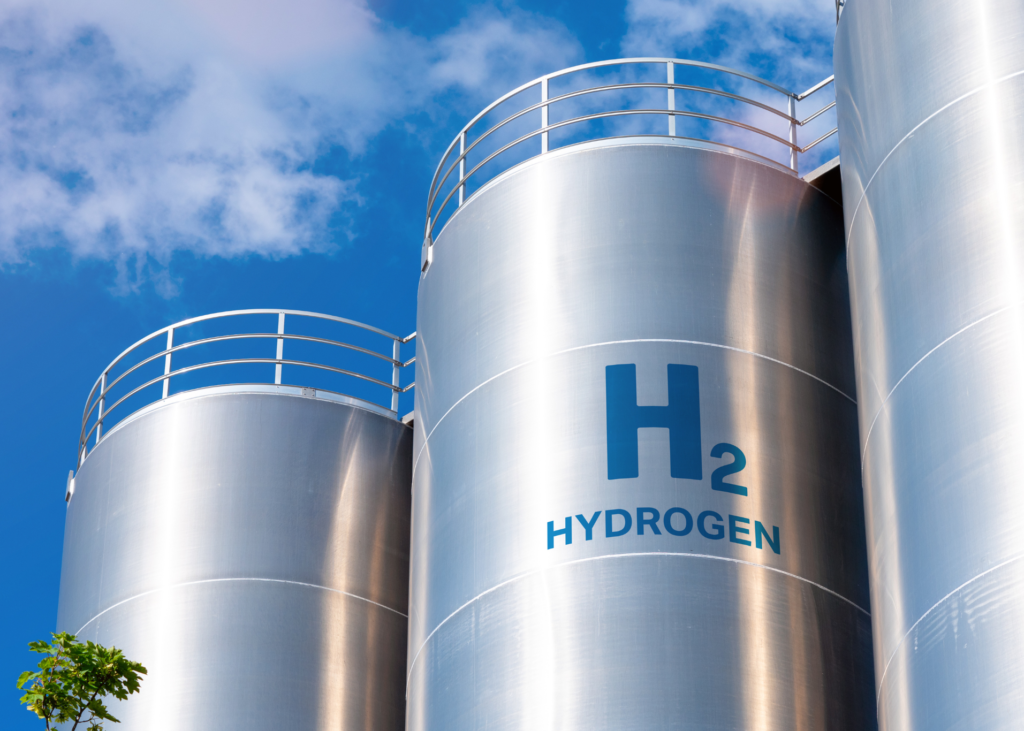Hydrogen
Renewable energies are a cornerstone of the economies of both Scotland and Lower Saxony, forming a key pillar of their respective strategies to achieve climate neutrality and sustainable growth. Within this context, green hydrogen has emerged as a critical technology for ensuring a successful and resilient energy transition.
Scotland and Lower Saxony bring complementary strengths and perspectives to the development of a future hydrogen economy. Scotland is exceptionally well positioned to become a major producer of green hydrogen, thanks to its vast potential in renewable energy generation, particularly from onshore and offshore wind farms. This capacity allows for the large-scale production of hydrogen through electrolysis, powered by clean, domestically generated electricity.
In contrast, Lower Saxony serves as a vital logistics and energy infrastructure hub. It offers substantial underground storage capacities, well-developed port infrastructure, and established landing points for gas and electricity imports. These assets make the region strategically suited for the import, distribution, and storage of green hydrogen at scale. Moreover, Lower Saxony is home to energy-intensive industries – such as steel, chemical, and cement production – that represent significant potential demand for renewable energy carriers like hydrogen.
Together, the regions are ideally positioned to complement each other’s strengths: Scotland’s production potential can be matched with Lower Saxony’s infrastructure and industrial demand. This natural synergy forms a strong basis for enhanced cooperation in hydrogen research and development, with the aim of building integrated solutions for a low-carbon future.


Online H2-Research Market Place
What is it?
An academic matchmaking event focused on hydrogen research, bringing together researchers from Lower Saxony and Scotland. The aim is to spark strong, future-oriented partnerships that are well-positioned for third-party funding.
How does it work?
- Short Pitches: Selected researchers present their hydrogen-focused ideas in 1–2 minute pitches.
- Interactive Breakout Discussions: Participants join online “tables” to dive deeper, brainstorm, and explore potential collaborations.
Why does it matter?
This event is part of the broader Flagship Initiative “Lower Saxony – Scotland Strategic Energy Partnership” designed to support joint work on the energy transition. Leveraging Scotland’s strengths in hydrogen production and Lower Saxony’s strategic infrastructure and industrial demand, the Market Place serves as a first step in fostering targeted academic collaboration.
Key Benefits
- Explore Regional Research: Gain a clear overview of current hydrogen-related work in both regions.
- Discover Collaboration Opportunities: Identify promising areas for joint research and project development.
- Pitch Your Ideas: Showcase your research concepts and generate interest for bi- and multilateral projects.
- Build Your Network: Meet colleagues, exchange insights, and form strong academic partnerships.
Research Themes & Format
Participants can engage in one or more focused sessions based on the following topics, using a World-Café-style format for dynamic, small-group discussions:
1. H₂ Production, Transport & Storage Technologies + Energy System Integration
Electrolysis, electrochemical engineering, hydrogen from waste, blue hydrogen, storage modelling, geological storage, hydrides, nanomaterials, integration strategies etc.
Sector coupling, life-cycle analysis, techno-economic assessments, and socio-environmental impacts.
2. H₂ Conversion, Utilisation & Material Research
Fuel cells, hydrogen combustion, synthetic fuels, end-use technologies, catalysts, membrane electrolysis materials, and storage media.
Presenter or Visitor?
- As a presenter, you’ll share your idea during the plenary pitch session and guide follow-up discussions.
- As a visitor, you can choose which pitches to attend and offer feedback and insights.
Follow-Up Drop-In Lunch Sessions
To sustain momentum and encourage further exchange, we will host two informal online sessions, in which we will explore collaborations, highlight matches, and provide detailed information on funding opportunities:
- Session 1: Tuesday, 16 December 2025, 12:00 pm GMT / 1:00 pm CET
- Session 2: Wednesday, 21 January 2026, 12:00 pm GMT / 1:00 pm CET
Registered participants will receive the Zoom login data via email. It will be the same for both sessions.
Programme
Leading Institutions
The event is co-organised by the following partners:
Energy Research Centre Lower Saxony (efzn)
Under the umbrella of the efzn scientists from natural, technical, economic, social and legal sciences come together to conduct research on energy transition in Lower Saxony. The efzn is a networking and communication platform enabling interdisciplinary and transdisciplinary research as well as research transfer into the economy, politics, and civil society. Hydrogen is one of the research areas covered by efzn-scientists. The efzn H2-research network involves around 20 research teams from Lower Saxony who work together in six focus groups: (1) hydrogen supply through water electrolysis, (2) underground hydrogen storage and infrastructure, (3) sustainable hydrogen combustion, (4) conversion of hydrogen into other energy sources, (5) fuel cell technology, and (6) energy system analysis.
Scottish Energy Technology Partnership (ETP) and Scottish Research Partnership in Engineering (SRPe)
ETP is an autonomous alliance of 14 independent Scottish Higher Education Institutions providing world-class capability and resources in energy R&I. Established in 2008, it works in strategic partnership with innovation translators, industry and government to future-proof Scotland’s position as a world-class centre of research excellence and globally competitive driving force in energy, and is a key actor in Scotland’s ambitions towards a Just Transition to Net Zero. ETP’s mission is to translate excellent research and innovation in the energy sector into impact for Scotland through collaboration. ETP has recently strategically integrated with the Scottish Research Partnership in Engineering (SRPe) to form SPEERI: the Scottish Partnership in Energy and Engineering Research & Innovation (SPEERI). SRPe and ETP represent two critical partnerships in Scotland’s innovation ecosystem, and this integrated entity builds on the strong history of individual delivery and collaboration between the two.
European Centre for Advanced Studies (ECAS)
ECAS supports academic exchange as well as internationalisation between Lower Saxonian and Scottish higher education institutions. By offering a platform for knowledge exchange and international partnerships, ECAS has an important function as network provider and broker to foster collaboration between the two academic regions. ECAS connects scholars, institutions, and industries to address global challenges through innovative research, knowledge transfer as well as learning and teaching. It specifically supports Flagship Initiatives such as the Strategic Energy Partnership, of which the sub-topic of Hydrogen is part, driving transformative projects that shape the future of academia.




